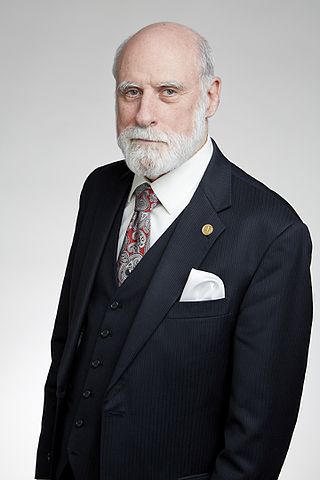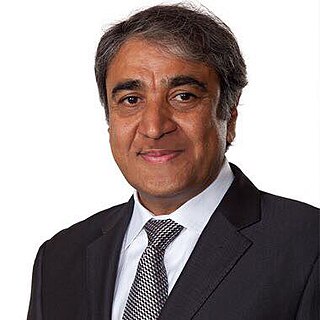Related Research Articles
Software engineering is an engineering-style system of software development. A software engineer is a person who applies the principles of software engineering to design, develop, maintain, test, and evaluate computer software. The term programmer is sometimes used as a synonym, but may also lack connotations of engineering education or skills.

Vinton Gray Cerf is an American Internet pioneer and is recognized as one of "the fathers of the Internet", sharing this title with TCP/IP co-developer Bob Kahn. He has received honorary degrees and awards that include the National Medal of Technology, the Turing Award, the Presidential Medal of Freedom, the Marconi Prize, and membership in the National Academy of Engineering.

Robert Elliot Kahn is an American electrical engineer who, along with Vint Cerf, first proposed the Transmission Control Protocol (TCP) and the Internet Protocol (IP), the fundamental communication protocols at the heart of the Internet.
In systems engineering, dependability is a measure of a system's availability, reliability, maintainability, and in some cases, other characteristics such as durability, safety and security. In real-time computing, dependability is the ability to provide services that can be trusted within a time-period. The service guarantees must hold even when the system is subject to attacks or natural failures.
Keith Uncapher (1922–2002) was an American computer engineer and manager. At the RAND Corporation Uncapher worked on several pioneering computer projects. He founded the Information Sciences Institute (ISI) at the University of Southern California, Viterbi School of Engineering. There, he assembled teams of engineers who helped to grow the early Internet.
John Nelson Warfield was an American systems scientist, who was professor and director of the Institute for Advanced Study in the Integrative Sciences (IASIS) at George Mason University, and president of the Systems, Man, and Cybernetics Society.
Dr. Lawrence Jerome Fogel was a pioneer in evolutionary computation and human factors analysis. He is known as the inventor of active noise cancellation and the father of evolutionary programming. His scientific career spanned nearly six decades and included electrical engineering, aerospace engineering, communication theory, human factors research, information processing, cybernetics, biotechnology, artificial intelligence, and computer science.
Edward Joseph McCluskey was a professor at Stanford University. He was a pioneer in the field of Electrical Engineering.
Elaine Jessica Weyuker is an ACM Fellow, an IEEE Fellow, and an AT&T Fellow at Bell Labs for research in software metrics and testing as well as elected to the National Academy of Engineering. She is the author of over 130 papers in journals and refereed conference proceedings.

Pradeep Kumar Khosla is an Indian-American computer scientist and university administrator.
Chen Wen-tsuen is an ethnic Taiwanese computer scientist, a distinguished research fellow at the Academia Sinica and a lifelong national chair of the Ministry of Education, Taiwan. From 2006 to 2010, he was the president of the National Tsing Hua University, a premier research university in Taiwan.
Bill Curtis is a software engineer best known for leading the development of the Capability Maturity Model and the People CMM in the Software Engineering Institute at Carnegie Mellon University, and for championing the spread of software process improvement and software measurement globally. In 2007 he was elected a Fellow of the Institute of Electrical and Electronics Engineers (IEEE) for his contributions to software process improvement and measurement. He was named to the 2022 class of ACM Fellows, "for contributions to software process, software measurement, and human factors in software engineering".
Theodore (Ted) Scott Rappaport is an American electrical engineer and the David Lee/Ernst Weber Professor of Electrical and Computer Engineering at New York University Tandon School of Engineering and founding director of NYU WIRELESS.
Nasir Memon is a computer scientist based in Brooklyn, New York. Memon is a professor and chair of the New York University Tandon School of Engineering computer science and engineering department and affiliate faculty at the computer science department in the Courant Institute of Mathematical Sciences at New York University. He is also the Department Head of NYU Tandon Online, the online learning unit of the school. He introduced cyber security studies to New York University Tandon School of Engineering, making it one of the first schools to implement the program at the undergraduate level. Memon holds twelve patents in image compression and security. He is the founding director of the Center for Interdisciplinary Studies in Security and Privacy (CRISSP) and CRISSP Abu Dhabi. In 2002, Memon founded Cyber Security Awareness Week (CSAW), an annual conference where tens of thousands of students compete in events and learn skills in cyber security Memon is also co-founder of Digital Assembly, a software company that develops digital forensics and data recovery and Vivic, a company that produces malware detection software. Memon has published over 250 articles in journals and conferences and has contributed to articles regarding cyber security in magazines such as Crain’s New York Business, Fortune, and USA Today. His research has been featured in NBC Nightly News, The New York Times, MIT Review, Wired.Com, and New Science Magazine.
Chanan Singh is an Indian-American electrical engineer and professor in the Department of Electrical and Computer Engineering, Texas A&M University. He was named Irma Runyon Chair Professor and Texas A&M System Regents Professor.
Timothy M. Pinkston is an American computer engineer, researcher, educator and administrator whose work is focused in the area of computer architecture. He holds the George Pfleger Chair in Electrical and Computer Engineering and is a Professor of Electrical and Computer Engineering at University of Southern California (USC). He also serves in an administrative role as Vice Dean for Faculty Affairs at the USC Viterbi School of Engineering.
Arun K. Somani is Associate Dean for Research of College of Engineering, Distinguished Professor of Electrical and Computer Engineering and Philip and Virginia Sproul Professor at Iowa State University. Somani is Elected Fellow of Institute of Electrical and Electronics Engineers (IEEE) for “contributions to theory and applications of computer networks” from 1999 to 2017 and Life Fellow of IEEE since 2018. He is Distinguished Engineer of Association for Computing Machinery(ACM) and Elected Fellow of The American Association for the Advancement of Science(AAAS).
Kishor Shridharbhai Trivedi is an Indian-American computer scientist who is currently the Hudson Chaired Professor in department of electrical and computer engineering at Duke University.
References
- 1 2 TCFT Candidate: Robert Swarz, IEEE Computer Society (retrieved Jan. 13 2013)
- 1 2 3 Robert S. Swarz, a WPI profile
- ↑ David G. Stork, "Hal's Legacy: 2001'S Computer As Dream and Reality", MIT Press, 1997 p.73